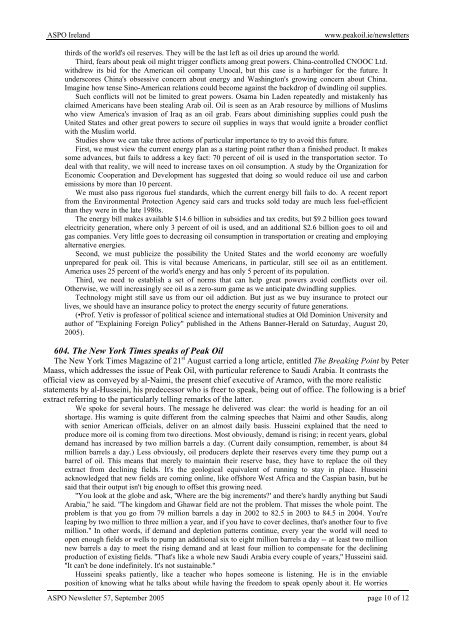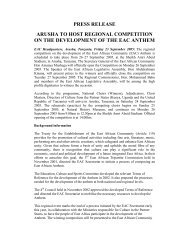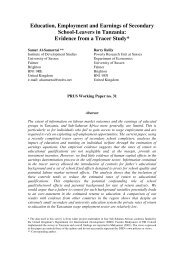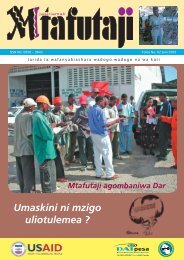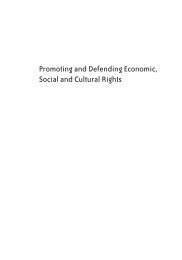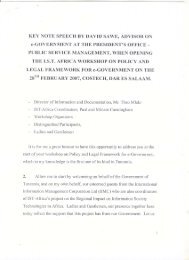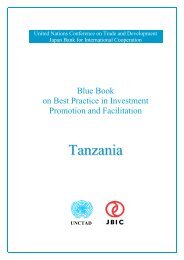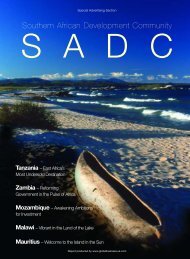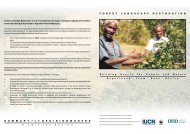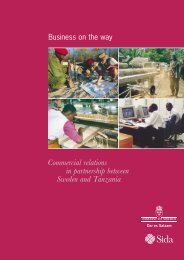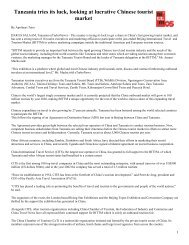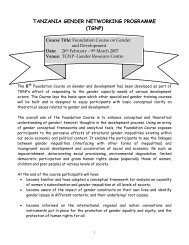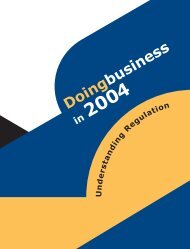September 2005 - Tanzania Development Gateway
September 2005 - Tanzania Development Gateway
September 2005 - Tanzania Development Gateway
Create successful ePaper yourself
Turn your PDF publications into a flip-book with our unique Google optimized e-Paper software.
ASPO Ireland<br />
www.peakoil.ie/newsletters<br />
thirds of the world's oil reserves. They will be the last left as oil dries up around the world.<br />
Third, fears about peak oil might trigger conflicts among great powers. China-controlled CNOOC Ltd.<br />
withdrew its bid for the American oil company Unocal, but this case is a harbinger for the future. It<br />
underscores China's obsessive concern about energy and Washington's growing concern about China.<br />
Imagine how tense Sino-American relations could become against the backdrop of dwindling oil supplies.<br />
Such conflicts will not be limited to great powers. Osama bin Laden repeatedly and mistakenly has<br />
claimed Americans have been stealing Arab oil. Oil is seen as an Arab resource by millions of Muslims<br />
who view America's invasion of Iraq as an oil grab. Fears about diminishing supplies could push the<br />
United States and other great powers to secure oil supplies in ways that would ignite a broader conflict<br />
with the Muslim world.<br />
Studies show we can take three actions of particular importance to try to avoid this future.<br />
First, we must view the current energy plan as a starting point rather than a finished product. It makes<br />
some advances, but fails to address a key fact: 70 percent of oil is used in the transportation sector. To<br />
deal with that reality, we will need to increase taxes on oil consumption. A study by the Organization for<br />
Economic Cooperation and <strong>Development</strong> has suggested that doing so would reduce oil use and carbon<br />
emissions by more than 10 percent.<br />
We must also pass rigorous fuel standards, which the current energy bill fails to do. A recent report<br />
from the Environmental Protection Agency said cars and trucks sold today are much less fuel-efficient<br />
than they were in the late 1980s.<br />
The energy bill makes available $14.6 billion in subsidies and tax credits, but $9.2 billion goes toward<br />
electricity generation, where only 3 percent of oil is used, and an additional $2.6 billion goes to oil and<br />
gas companies. Very little goes to decreasing oil consumption in transportation or creating and employing<br />
alternative energies.<br />
Second, we must publicize the possibility the United States and the world economy are woefully<br />
unprepared for peak oil. This is vital because Americans, in particular, still see oil as an entitlement.<br />
America uses 25 percent of the world's energy and has only 5 percent of its population.<br />
Third, we need to establish a set of norms that can help great powers avoid conflicts over oil.<br />
Otherwise, we will increasingly see oil as a zero-sum game as we anticipate dwindling supplies.<br />
Technology might still save us from our oil addiction. But just as we buy insurance to protect our<br />
lives, we should have an insurance policy to protect the energy security of future generations.<br />
(•Prof. Yetiv is professor of political science and international studies at Old Dominion University and<br />
author of "Explaining Foreign Policy" published in the Athens Banner-Herald on Saturday, August 20,<br />
<strong>2005</strong>).<br />
604. The New York Times speaks of Peak Oil<br />
The New York Times Magazine of 21 st August carried a long article, entitled The Breaking Point by Peter<br />
Maass, which addresses the issue of Peak Oil, with particular reference to Saudi Arabia. It contrasts the<br />
official view as conveyed by al-Naimi, the present chief executive of Aramco, with the more realistic<br />
statements by al-Husseini, his predecessor who is freer to speak, being out of office. The following is a brief<br />
extract referring to the particularly telling remarks of the latter.<br />
We spoke for several hours. The message he delivered was clear: the world is heading for an oil<br />
shortage. His warning is quite different from the calming speeches that Naimi and other Saudis, along<br />
with senior American officials, deliver on an almost daily basis. Husseini explained that the need to<br />
produce more oil is coming from two directions. Most obviously, demand is rising; in recent years, global<br />
demand has increased by two million barrels a day. (Current daily consumption, remember, is about 84<br />
million barrels a day.) Less obviously, oil producers deplete their reserves every time they pump out a<br />
barrel of oil. This means that merely to maintain their reserve base, they have to replace the oil they<br />
extract from declining fields. It's the geological equivalent of running to stay in place. Husseini<br />
acknowledged that new fields are coming online, like offshore West Africa and the Caspian basin, but he<br />
said that their output isn't big enough to offset this growing need.<br />
''You look at the globe and ask, 'Where are the big increments?' and there's hardly anything but Saudi<br />
Arabia,'' he said. ''The kingdom and Ghawar field are not the problem. That misses the whole point. The<br />
problem is that you go from 79 million barrels a day in 2002 to 82.5 in 2003 to 84.5 in 2004. You're<br />
leaping by two million to three million a year, and if you have to cover declines, that's another four to five<br />
million.'' In other words, if demand and depletion patterns continue, every year the world will need to<br />
open enough fields or wells to pump an additional six to eight million barrels a day -- at least two million<br />
new barrels a day to meet the rising demand and at least four million to compensate for the declining<br />
production of existing fields. ''That's like a whole new Saudi Arabia every couple of years,'' Husseini said.<br />
''It can't be done indefinitely. It's not sustainable.''<br />
Husseini speaks patiently, like a teacher who hopes someone is listening. He is in the enviable<br />
position of knowing what he talks about while having the freedom to speak openly about it. He worries<br />
ASPO Newsletter 57, <strong>September</strong> <strong>2005</strong> page 10 of 12


